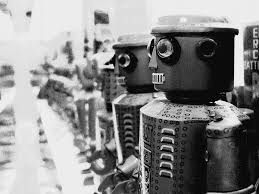In their Matter essay, “Our Transparent Future,” Daniel C. Dennett and Deb Roy examine transparency from an evolutionary perspective and guess where this new normal (abnormal?) is taking us. When the Internet of Things is the thing, when drones and such shrink to the head of a pin, transparency will be the rule, almost everything knowable and leakable, which is a blessing and curse. And you’ll hardly hear the monitoring. It will flow like electricity through a wire, so quiet. The opening:
More than half a billion years ago a spectacularly creative burst of biological innovation called the Cambrian explosion occurred. In a geologic “instant” of several million years, organisms developed strikingly new body shapes, new organs, and new predation strategies and defenses against them. Evolutionary biologists disagree about what triggered this prodigious wave of novelty, but a particularly compelling hypothesis, advanced by University of Oxford zoologist Andrew Parker, is that light was the trigger. Parker proposes that around 543 million years ago, the chemistry of the shallow oceans and the atmosphere suddenly changed to become much more transparent. At the time, all animal life was confined to the oceans, and as soon as the daylight flooded in, eyesight became the best trick in the sea. As eyes rapidly evolved, so did the behaviors and equipment that responded to them.
Whereas before all perception was proximal — by contact or by sensed differences in chemical concentration or pressure waves — now animals could identify and track things at a distance. Predators could home in on their prey; prey could see the predators coming and take evasive action. Locomotion is a slow and stupid business until you have eyes to guide you, and eyes are useless if you cannot engage in locomotion, so perception and action evolved together in an arms race. This arms race drove much of the basic diversification of the tree of life we have today.
Parker’s hypothesis about the Cambrian explosion provides an excellent parallel for understanding a new, seemingly unrelated phenomenon: the spread of digital technology. Although advances in communications technology have transformed our world many times in the past — the invention of writing signaled the end of prehistory; the printing press sent waves of change through all the major institutions of society — digital technology could have a greater impact than anything that has come before. It will enhance the powers of some individuals and organizations while subverting the powers of others, creating both opportunities and risks that could scarcely have been imagined a generation ago.•


